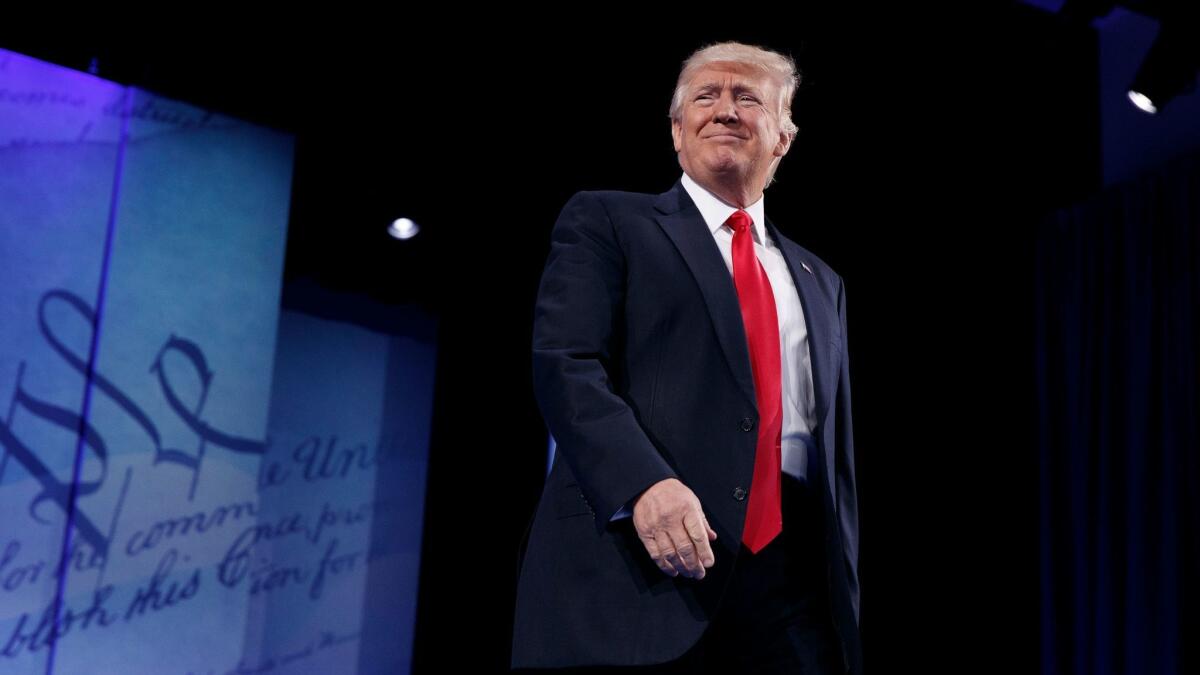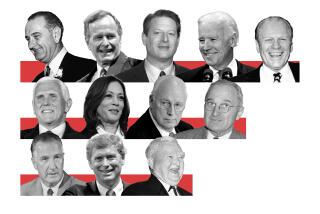Column: The federal bureaucracy needs an overhaul, but Trump’s budget plan is nonsensical

- Share via
Here’s one thing President Trump is right about: The federal bureaucracy is due for an overhaul.
“Our moral duty to the taxpayer requires us to make our government leaner and more accountable,” Trump said last week before he unveiled his first budget proposal. “We must do a lot more with less.”
That’s not a controversial proposition. Members of Congress and public management experts from both parties agree with it. The federal bureaucracy, hamstrung by rules from the last century, is way behind the private sector in management practices. Even federal workers think so. In the government’s last employee survey, more than half said their organizations don’t do enough to reward innovation or weed out poor performers.
So if Trump wants to fix it, hurrah. But he’s going about it the wrong way — with a blunderbuss of a budget plan and a reorganization order that, so far, is almost completely content-free.
There is one other place Trump could look for management expertise: Congress. Don’t laugh.
Let’s start with the budget proposal, a blueprint the White House called a “skinny budget.” It wasn’t about eliminating waste, increasing efficiency or reducing federal spending overall. It didn’t even touch the deficit. Instead, Trump’s plan had one goal: fulfilling his campaign promises to increase spending on defense, veterans and immigration enforcement, including a border wall.
To do that, budget director Mick Mulvaney slashed the funding of domestic programs that make up less than one-fifth of the budget, as well as State Department spending. (He didn’t go near Social Security and Medicare because Trump made a campaign promise to leave them alone.)
These cuts produced some odd results. The proposal would shrink the budgets of the Coast Guard, which protects ports, and the Transportation Safety Administration, which protects air travel, to pay for the wall, which almost nobody thinks would do much to stop terrorists or drug smugglers. It would also make the State Department and the Environmental Protection Agency less able to do their jobs, but no more efficient.
“It’s about as precise as civil war battlefield surgery,” said Paul C. Light, a government management expert at New York University. “If there’s a wound, you just amputate the whole leg.”
Even Republicans in Congress said they didn’t like it much. One GOP senator said the State Department cuts were “dead on arrival,” suggesting that, even more than other presidents’ budgets, this one is likely to be remembered only as a wish list — an unrealistic opening bid from a man who considers himself a wily negotiator. Congress, not the president, makes the real decisions on budgets and spending, and all of the programs Trump wants to slash are sacred to somebody on Capitol Hill.
But Trump took a second big action last week, even before releasing his budget plan: He signed an executive order calling for a major reorganizing of the federal bureaucracy. He asked agencies and the public to suggest programs that could be eliminated, slimmed down or combined. And he gave Mulvaney one year to produce a comprehensive plan.
If that sounds vague, it’s because it is. “It was basically a punt,” Light said.
The first problem with Trump’s order, Light said, is that federal agencies are unlikely to come up with creative plans to reorganize or downsize themselves. “The agencies have very little capacity to analyze themselves,” he said.
That’s why earlier efforts at reorganization often started with a president assembling an outside commission (Ronald Reagan did that in 1981) or a White House task force (Bill Clinton, in 1993). Trump hasn’t done that. And there doesn’t seem to be anyone on his staff who’s a natural reinventor, even though the president has appointed plenty of people from the private sector. Mulvaney is a former congressman with a fearsome reputation as a budget cutter, but not as a reformer. “You’ve got a bunch of real estate developers, investment bankers and members of Congress,” Light said. “They may be very smart people, but they are all from very flat organizations” — unlike the very un-flat bureaucracy.
There is one other place Trump could look for management expertise: Congress. Don’t laugh.
Rep. Jason Chaffetz (R-Utah) has been working on ideas to reform the bureaucracy for several years. His proposals include offering a buyout to federal workers to encourage more retirements, and then filling only one in three of the jobs that come open. More boldly, he’s talked about increasing salaries for high-achieving bureaucrats in a pay-for-performance system. But getting any of those ideas through the Senate would require bipartisan cooperation, and neither Trump nor Chaffetz has worked very hard on that.
One other strategy Trump could tackle: increasing federal efforts to collect unpaid taxes and recoup improper federal payments, such as fraudulent Medicare charges. “That’s where the real money is,” Light said. “That’s waste, fraud and abuse. But you can’t collect it by cutting staff. You’d have to staff up instead. You’ve got to spend money to save money.”
This isn’t on Trump’s to-do list. Instead, he’s merely proposing to cut the federal programs he doesn’t like — a non-plan that’s already running into trouble in Congress.
He ran for president bragging of his success as an entrepreneur. He promised to bring top talent from the private sector into the government. If there were ever a chance to wrestle the federal bureaucracy into the 21st century, this should be it. But so far it looks, sadly, like an opportunity Trump is determined to miss.
Twitter: @DoyleMcManus
Follow the Opinion section on Twitter @latimesopinion or Facebook
MORE FROM OPINION
The fight over voting rules didn’t start with Trump’s tweets
The Republican case for breaking up the notoriously liberal 9th Circuit makes no sense
The most relevant dystopian novel for our time is not ‘1984’ — it’s ‘Lord of the Flies’
More to Read
A cure for the common opinion
Get thought-provoking perspectives with our weekly newsletter.
You may occasionally receive promotional content from the Los Angeles Times.









